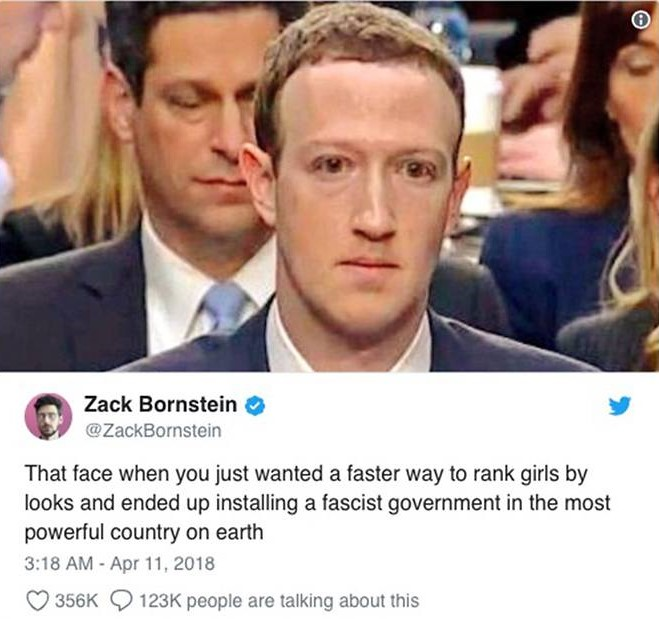The Image Source
This is the image someone named Zack Bornstein posted on Twitter in the midst of the Cambridge Analytica scandal:

The text below the picture gives a comprehensive perspective on the Cambridge Analytica scandal and Mark Zuckerberg’s part in it. Although Zack’s opinion might sound somewhat superficial, it happens to be based on a deeper analysis, as will be proved further. In general, the image refers to Mark being testified several times in front of the US Congress, including during the criminal investigation of Facebook’s data-sharing policies.
The Text Source
The written source analyzed here is the WIRED article titled “How Cambridge Analytica Sparked the Great Privacy Awakening”
It is noteworthy that after Mark Zuckerberg’s speech in Congress regarding the protection of personal data, the first impression was that he was incompetent and presumed guilty of data leakage. Subsequently, Zuckerberg convinced congressmen that his company was not selling data but rather an access to potential data providers, who should have given their written consent to the data provision and processing by the third-party applications. Many audiovisual media, including the US and international TV channels, have portrayed Zuckerberg as a villain, emphasizing this characterization through specific cinematography framing. Nonetheless, information about the unconditional guilt of the digital multimillionaire was not announced directly in the text messages, probably due to the lack of evidence.
This article is engaging since it brings readers’ attention back to the fact that information about Cambridge Analytica’s illegal data collection and manipulation activities was shared as early as 2015. It was published by The Guardian writer Harry Davis even before Mr. Trump won the primaries (Lapowsky, 2019). In other words, the author of the article rightly emphasizes the ingrained at the time social tendency to ignore the importance of personal data security. The author also acknowledges the nonchalance of Zuckerberg, who wrote in his e-mail to the director of product development in 2012 that he is “generally skeptical that there is as much data leak strategic risk” (Lapowsky, 2019, para. 1). Therefore, carelessness, not malice, led to the manipulations of the voters’ political preferences carried out by the Cambridge Analytica research agency.
Analysis
Both submitted texts discuss the issue of data privacy protection and data security. The first text ironically portrays how Mark Zuckerberg has come to be seen as the person responsible for the manipulation of the users’ data (Bornstein, 2018). Nonetheless, according to Mark, Facebook only allows third-party applications to ask users to consent or disagree with the use of their data. The second text explores the topic in more detail, criticizing the carelessness of the head of Facebook but not pointing out the people who are liable for the data trading practice.
Therefore, both articles do not agree with the opinion that Mark Zuckerberg is personally responsible and able to solve all the problems related to data privacy protection. On the one hand, Facebook is an information-sharing platform accessed by many individuals and companies, and given the number of users who can bypass some software protection systems, it is extremely difficult to control their activities on the platform. On the other hand, both the Internet and social media should be safe places to share data, and the head of Facebook is accountable for the safety of his users.
The very issue of privacy and data usage is still considered ‘contradictory,’ even among scholars. Wieringa et al. (2021) suggest that “firms can implement a wide range of methods that satisfy different degrees of privacy and still enable them to leverage varied data analytics methods” (p. 915). The scholars imply that fair methodology and legislation should regulate such practices. The synthesis of the texts also brings to mind the differences in US and EU legislation that led to the escape of punishment for Cambridge Analytica leader and mastermind Alexander Nix (Rustad & Koenig, 2019).
Interestingly, the scholarly discourse highlights the emergence of the new concept that social media users and their data are a ‘product’ that can be sold to stakeholders (Fiesler & Hallinan, 2018). In light of the above, the fairness of judgment and the transparency of information is of great importance, as addressing the issue of personal data security can be tricky. This decision involves the creation of a legislative framework that will effectively regulate the activities of companies and social networks on the Internet, as Zuckerberg stated during his speech to Congress.
Equally important, legislative regulation with a stable system of fines and punishments will allow citizens to be more aware of the problem. At the same time, companies will feel that the era of impunity and complete freedom is over, and perhaps, will become more ethical about personal data. Just as importantly, companies like Google will receive less personal information about users, which will reduce the tendency to create information bubbles. Remarkably, Facebook’s advertising policy that leads to stories and topics being offered based on tastes and preferences should also be declared illegal, as it creates an addiction for users, although this will be hard to prove in court.
Reference List
Bornstein, Z. (2018). [Image]. Web.
Fiesler, C., & Hallinan, B. (2018, April). ” We are the product“: public reactions to online data sharing and privacy controversies in the media. In Proceedings of the 2018 CHI Conference on Human Factors in Computing Systems (pp. 1-13).
Lapowsky, I. (2019). “How Cambridge Analytica sparked the great privacy awakening.” WIRED. Web.
Rustad, M. L., & Koenig, T. H. (2019). “Towards a global data privacy standard.” Journal of Data Research, 71, 365.
Wieringa, J., Kannan, P. K., Ma, X., Reutterer, T., Risselada, H., & Skiera, B. (2021). Data analytics in a privacy-concerned world. Journal of Business Research, 122, 915-925.